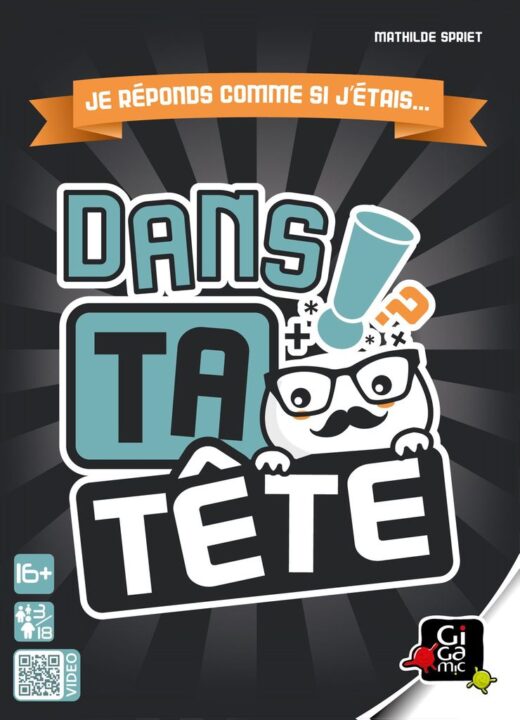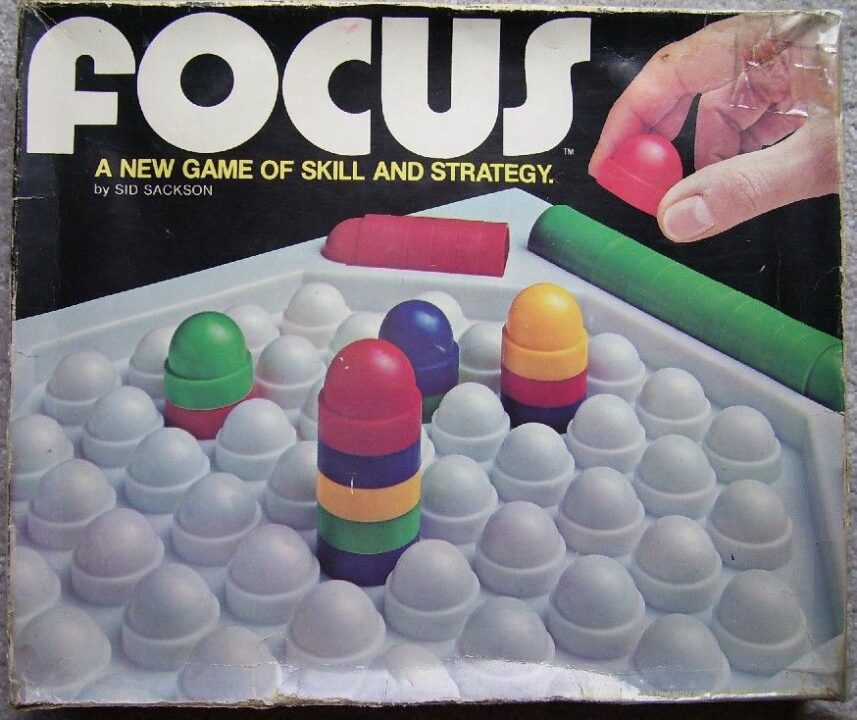If you’re after a game that won’t make you blame the dice or threaten to flip the table, you’re in the right place. This is my review of Focus, a game that’s all about outsmarting your friends, stacking plastic rings, and plotting moves that will make them question your friendship choices. I’ve played this one far more times than I’d like to admit, so get ready for an honest look at what makes Focus tick—and what nearly made me lose it.
How It Plays
Setting up
Unfold the board. Each player grabs their own set of colored rings. You fill the board spaces with the starting pattern, which is honestly as easy as making a sandwich if the bread kept sliding away. Now you’re ready!
Gameplay
Players take turns moving stacks of rings. You can move a stack if your color is on top. The number of pieces in the stack shows how far you can go (one piece, one space, two pieces, two spaces, and so on). If you stack more than five rings, the extras pop off and go into your score pile, which always feels a bit like finding spare fries at the bottom of the bag.
Winning the game
Keep playing until no one can move. The player with the most of their own color in their score pile wins. Simple, fun, and surprisingly cutthroat. My friend Dave still claims his cat distracted him the last time he lost, but we all know he just got outplayed.
Want to know more? Read our extensive strategy guide for Focus.
Gameplay Mechanics and Player Interaction in Focus
If you’re tired of board games that feel like you’re rolling dice and praying for mercy, then Focus might just surprise you. I played this with my buddy Carl, who thinks he’s a board game mastermind. Let me tell you, in Focus, brains matter way more than luck. The gameplay boils down to moving stacks of colored marbles on a grid, trying to push your opponents’ pieces off the edge, while you secretly hope they’re not plotting your doom. It’s like chess and bumper cars had a very organized baby.
What stands out most is the stacking mechanic. Each stack has a “controller”—the player whose color is on top. But don’t blink, because one bad move and you might lose control, or worse, send your own marble off the board (don’t ask how I know). The balance between attack and defense is tight, which makes every turn pretty tense. I once stared at the board for five solid minutes, pretending it was deep strategy, but really, I was stalling for time.
Player interaction in Focus is as spicy as a jalapeño. You can’t just do your own thing—every action affects everyone else. I tried ignoring my friends’ moves once, and they teamed up to wipe me out faster than you can say “Focus.” If you enjoy outwitting friends and getting revenge for last game’s betrayal, you’ll love it, but if you need lots of people, sorry—Focus maxes out at four.
No game is perfect, though. If someone gets picked on, they can be out early and end up as the official snack fetcher. But unlike games ruined by random chance, Focus rewards careful planning. Next up, I’ll talk about the stuff you can touch—let’s roll onto component quality and board design (and pray there are no cardboard catastrophes).

Component Quality and Board Design in Focus: Worth the Hype?
Let’s talk about the stuff you touch, stack, and inevitably drop under the table: the components! Focus, with its chunky plastic rings, makes me feel like I’m stacking doughnuts—with none of the sticky fingers. These aren’t your average, flimsy bits. They’re solid, they clack together with a satisfying thunk, and they feel like they can survive even your most dramatic game night flails. (Yes, Mark, looking at you.) The colors pop, making it easy to spot which stack belongs to who—no more squinting across the table in confusion.
The board itself is simple but effective. It’s round, which always confuses my cat—she can’t sit in it like a regular box! The spaces are clear and well-sized, so when things heat up and stacks start piling, you won’t accidentally knock everything over. Focus doesn’t try to wow you with fancy artwork or crazy design—there are no dragons or glittery volcanoes here—but it works. The minimalist style keeps the attention where it should be: on the challenge and chaos that unfolds across the board.
If I had one gripe, it’s that after a few rounds, those rings can get a little greasy from all the snacky fingers. (Tip: pizza night and Focus don’t mix without napkins.) But hey, at least they’re easy to clean! I wish the box insert did a better job of holding everything in place, though. After a bumpy bus ride to a friend’s house, it looked like someone had shaken a maraca full of plastic rings…
Next up, I’ll tackle replayability and game length—so grab your stopwatch, because things are about to get spicy!
Replayability and Game Length: Will You Keep Reaching for Focus?
So, there I was, staring down yet another loss against my friend Greg in Focus. “One more round!” I shouted. And you know what? I meant it. Focus scores big points for replayability. It’s easy to set up, the rounds fly by, and every game feels different—not because luck shakes things up, but because your opponent does. There’s something super satisfying about stacking the rings, planning your next sneaky move, and learning from your mistakes as you go along.
Game length is, in my experience, just right. You can breeze through a match of Focus in about 20 to 30 minutes, which is the sweet spot for getting a couple of games in before your pizza arrives (or before Greg gets too smug about his win streak). The short playtime also means that if you mess up spectacularly—guilty as charged—you’re not stuck for ages waiting for redemption. You can just set up and try again.
I wouldn’t say Focus is something you’d binge for hours and hours in one sitting, but it’s absolutely a game you’ll keep coming back to when you want something quick and brainy. Variety comes from your opponents’ tactics. Playing against someone new constantly keeps the challenge fresh, and even seasoned players might surprise you with wild moves.
And let’s not forget, Focus packs all of its fun into a neat, compact package—no sprawling boards or hour-long set ups here. It makes it easy to bring out for a coffee table challenge or to squeeze in a sneaky game before dinner. Next up, I’m about to get real about how Focus balances skill and luck, so buckle up—this is where the dice hit the road (figuratively, because, spoiler: there are no dice)!
Balance Versus Luck: Does Skill Win in Focus?
Ever get that feeling when you’re losing a game and you want to blame bad luck, but deep down you know it’s just you? That’s me every time I play Focus, except here, I can’t hide behind the old ‘unlucky roll’ excuse. Focus is a game for people who like to think, plan, and stare intensely at little plastic rings until their friends start sweating.
The beauty of Focus lies in its almost complete lack of luck. No dice to roll, no card draws to moan about – just you, the board, and your opponent’s stink eye. Every move counts, and every mistake sits there, glaring up at you until the game is over. If you win, you earned it. If you lose, well, start working on your excuses now.
What I love most is how Focus puts all players on even footing. Does your friend always say, “I just have bad luck!” when she loses? Give her Focus. Without randomness, the only way to win is by thinking smarter (or perhaps outlasting everyone’s patience, but don’t quote me on that).
Yet, this comes with a downside. If your group likes wild swings and crazy turnarounds, Focus might feel too serious. There’s no chance for a comeback from an unlucky event—bad decisions snowball fast. In one game, my mate Dave lost all his pieces in a single, dramatic stack-meltdown. He’s still salty.
Bottom line: If you love strategy and hate luck ruining your perfect plans, Focus is a must-have. I recommend it for anyone who enjoys a fair challenge. If you depend on luck, you might want to bring a four-leaf clover… but it won’t help.
Conclusion
If you love a game where skill wins the day, Focus is a solid pick. There’s no luck, just pure head-to-head strategy—and the chunky pieces make it feel good to play. Sure, the box insert is about as useful as a chocolate teapot, but the gameplay makes up for it. Focus will please puzzle lovers and folks who enjoy friendly rivalry (or, you know, want to find out which friend is secretly plotting their revenge over game night snacks). That wraps up my review! If you want a clever, quick, and fair game, Focus deserves a spot on your shelf.


